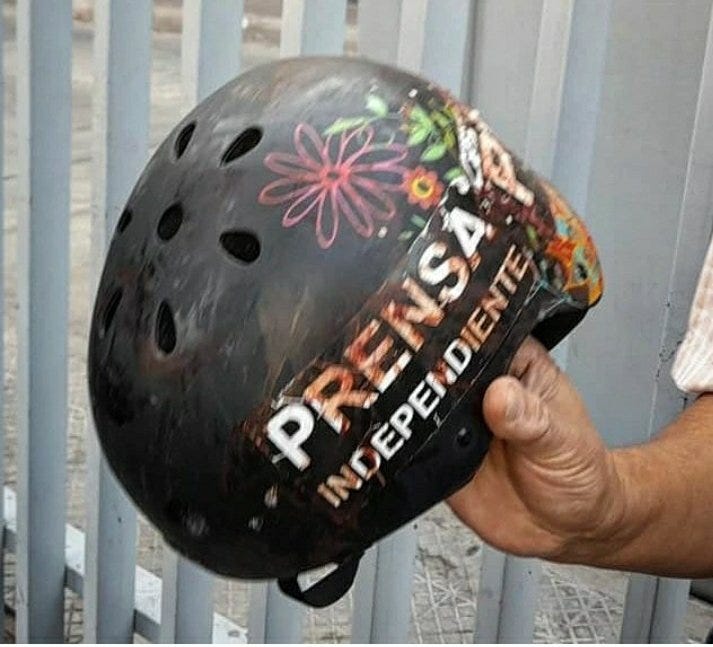
Ahoy Piratas!
We hope this May Day week found you well. It’s been a chaotic news week for the Americas in general with an uncommon number of major stories! We’ve written up the bits important to the regions we report on below as always.
Our audience survey is still going - it only takes five minutes and your feedback immeasurably helpful for us, so do fill it in if you can. The link is here.
This week’s podcast, Paulo and Amy look at the shooting of three journalists in the Chilean capital, Santiago, after a May Day march ended in violent confrontations between demonstrators, street vendors and the police. Three reporters were wounded by gunfire, and one, Francisca Sandoval, is still in hospital fighting for her life after being shot in the face. The events underscore the magnitude of the challenge facing new president, Gabriel Boric, a former student leader elected on a platform of transformation towards social justice.
THIS WEEK’S BREAKING STORIES
In Colombia an armed strike imposed by the Gaitanista Self-Defense Forces of Colombia (AGC) has paralyzed the northwestern region of the country. The paramilitary group was originally formed from the remnants of the United Self-Defense Forces of Colombia (AUC), a notorious right wing death squad during Colombia’s civil war. The strike has already left more than 32 vehicles incinerated and thousands of people confined in in the departments of Sucre, Cordoba, Bolívar, and part of Antioquia. The actions were announced in retaliation for the extradition of AGC’s top leader, alias Otoniel. Otoniel was extradited Wednesday and appeared on Thursday before a judge in the US to face drug charges.
In Peru on May 1, inflation reached its highest point in ten years, closing at 8.62% on the year. Rising real wage costs of living and food prices have directly impacted working class populations. The impact on other products such as fertilizers and fuels as well has left some analysts worried the phenomenon might become a trend.
In Havana, Cuba, a reported explosion destroyed the emblematic hotel, Saratoga, Friday morning and left at least 8 dead. The cause is not immediately clear. Numerous cars and adjacent buildings were also damaged or destroyed. Authorities are currently searching for survivors amid the rubble.
What we’re reading:
Latin American feminists are speaking out about a possible ban on abortion in the United States. This well done piece at The Guardian examines how Latin American feminist groups that for years have struggled to achieve progress in guaranteeing their reproductive rights, intend to fiercely protect their achievements in the face of a possible regressive ruling in the US. They fear the decision will have a domino effect in Latin America, where most countries have very restrictive laws for those who want to voluntarily interrupt a pregnancy.
What we’re listening to:
Renowned Colombian journalist, Maria Jimena Duzan, in her podcast this week called “A Fondo”, speaks in depth with vice-presidential candidate Francia Márquez. Through their conversation we get to know the most human side of the leader and clarify some unfounded scandals raised by right-wing critics. The interview provides a detailed description of the life and struggle of a social leader who is very close to being the first Black woman to hold top political office in the country.
Spanish word of the week:
ictericia - jaundice
Corrections: In PWS 22 October 2021, we stated that abortion was legal in Chile. It is, in fact, legal only in cases of rape, risk to the pregnant person’s life, or fatal foetal malformation.
¡NOTICIAS CASTELLANAS!
En Chile, en las manifestaciones por el Día del Trabajo, el pasado 1 de mayo, fueron heridos 3 periodistas por balas, 1 de ellos de gravedad. El caso más grave, se trata de Francista Sandoval, quien fue herida en medio de los saqueos y enfrentamientos que se registraron en un barrio en Santiago,. La periodista aún sigue en observación y en estado crítico. Hasta ahora no se sabe quien disparó a los periodistas.
En Colombia, un paro armado impuesto por las Autodefensas Gaitanistas de Colombia (AGC) ha paralizado la región noroccidental del país. El grupo paramilitar se formó originalmente a partir de los remanentes de las Autodefensas Unidas de Colombia (AUC), un notorio escuadrón de la muerte durante la guerra civil de Colombia. El paro ya ha dejado más de 32 vehículos incinerados y miles de personas confinadas en los departamentos de Sucre, Córdoba, Bolívar y parte de Antioquia. Las acciones fueron anunciadas en represalia por la extradición, del máximo dirigente de las AGC, alias Otoniel. Otoniel compareció ante un juez en EE.UU. para enfrentar cargos por drogas.
En Perú, se agudiza la preocupación por el alza en la inflación que el pasado 1 de mayo, llegó a su máximo en los últimos diez años, cerrando con un 8,62% para el año. La canasta familiar ha sido la principal afectada, impactando de manera directa a la población y encareciendo el costo de vida promedio. El alza ha afectado productos básicos de la canasta familiar como la zanahoria, pero también ha tenido un fuerte impacto en otros productos como los fertilizantes y los combustibles.
En La Habana, Cuba, una explosión destruyó un hotel emblemático, llamado Saratoga, el viernes por la mañana. La causa no está clara actualmente. Numerosos automóviles y edificios adyacentes también resultaron dañados o destruidos. Hay al menos 8 muertos. Actualmente, las autoridades buscan sobrevivientes entre los escombros.
¿Qué estamos leyendo?
Feministas latinoamericanas se pronuncian sobre la posible prohibición del aborto en Estados Unidos. Este bien hecho artículo de The Guardian examina cómo los grupos feministas latinoamericanos, que durante años han luchado por lograr avances en la garantía de sus derechos reproductivos, pretenden proteger fuertemente sus logros ante un posible fallo regresivo en EE.UU. Temen que la decisión también tendría un efecto dominó en América Latina, donde aún existen leyes muy restrictivas para quienes quieren interrumpir voluntariamente un embarazo.
¿Qué estamos escuchando?
La reconocida periodista colombiana, María Jimena Duzan, en su podcast “A Fondo”, habla en profundidad con la candidata a la vicepresidencia, Francia Márquez. A través de su conversación conocemos el lado humano del líder y esclarecemos algunos escándalos infundados suscitados por críticos de la derecha. La entrevista brinda una descripción detallada de la vida y lucha de una líder social que está muy cerca de ser la primera mujer negra en ocupar un cargo de magnitud en el país.













